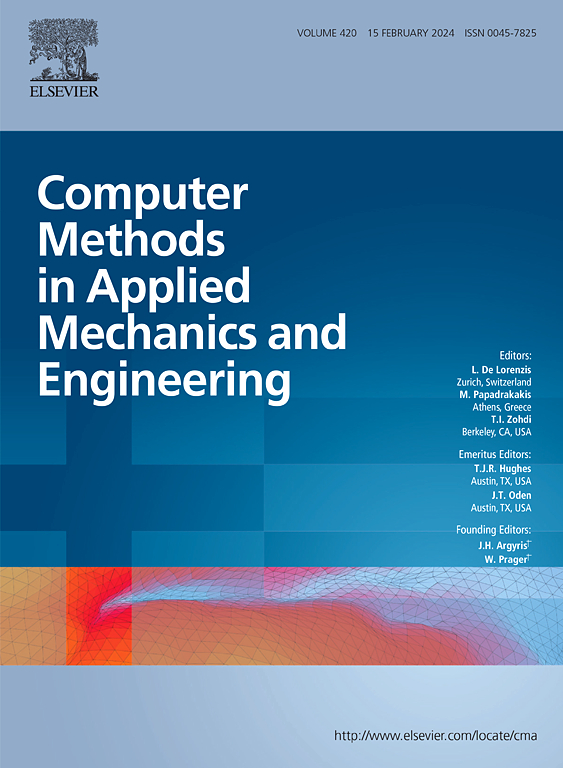Improving long-term autoregressive spatiotemporal predictions: A proof of concept with fluid dynamics
IF 7.3
1区 工程技术
Q1 ENGINEERING, MULTIDISCIPLINARY
Computer Methods in Applied Mechanics and Engineering
Pub Date : 2025-09-01
DOI:10.1016/j.cma.2025.118332
引用次数: 0
Abstract
Data-driven approaches have emerged as a powerful alternative to traditional numerical methods for forecasting physical systems, offering fast inference and reduced computational costs. However, for complex systems and those without prior knowledge, the accuracy of long-term predictions frequently deteriorates due to error accumulation. Existing solutions often adopt an autoregressive approach that unrolls multiple time steps during each training iteration; although effective for long-term forecasting, this method requires storing entire unrolling sequences in GPU memory, leading to high resource demands. Moreover, optimizing for long-term accuracy in autoregressive frameworks can compromise short-term performance. To address these challenges, we introduce the Stochastic PushForward (SPF) training framework in this paper. SPF preserves the one-step-ahead training paradigm while still enabling multi-step-ahead learning. It dynamically constructs a supplementary dataset from the model’s predictions and uses this dataset in combination with the original training data. By drawing inputs from both the ground truth and model-generated predictions through a stochastic acquisition strategy, SPF naturally balances short- and long-term predictive performance and further reduces overfitting and improves generalization. Furthermore, the training process is executed in a one-step-ahead manner, with multi-step-ahead predictions precomputed between epochs-thus eliminating the need to retain entire unrolling sequences in memory, thus keeping memory usage stable. We demonstrate the effectiveness of SPF on the Burgers’ equation and the Shallow Water benchmark. Experimental results demonstrated that SPF delivers superior long-term accuracy compared to autoregressive approaches while reducing memory consumption. This positions SPF as a promising solution for resource-constrained environments and complex physical simulations.
改进长期自回归时空预测:流体动力学概念的证明
数据驱动方法已经成为预测物理系统的传统数值方法的强大替代方案,提供快速推理和降低计算成本。然而,对于复杂系统和那些没有先验知识的系统,由于误差积累,长期预测的准确性经常下降。现有的解决方案通常采用自回归方法,在每次训练迭代中展开多个时间步骤;虽然这种方法对长期预测是有效的,但它需要将整个展开序列存储在GPU内存中,导致高资源需求。此外,在自回归框架中优化长期准确性可能会损害短期性能。为了解决这些挑战,我们在本文中引入了随机前推(SPF)训练框架。SPF保留了一步领先的训练范例,同时仍然支持多步领先的学习。它从模型的预测中动态构建一个补充数据集,并将该数据集与原始训练数据结合使用。SPF通过随机采集策略从实际情况和模型生成的预测中提取输入,自然地平衡了短期和长期预测性能,进一步减少了过拟合并提高了泛化。此外,训练过程以提前一步的方式执行,在每个epoch之间预先计算提前多步的预测,从而消除了在内存中保留整个展开序列的需要,从而保持内存使用稳定。我们在汉堡方程和浅水基准上证明了SPF的有效性。实验结果表明,与自回归方法相比,SPF提供了优越的长期准确性,同时减少了内存消耗。这使得SPF成为资源受限环境和复杂物理模拟的有前途的解决方案。
本文章由计算机程序翻译,如有差异,请以英文原文为准。
求助全文
约1分钟内获得全文
求助全文
来源期刊
CiteScore
12.70
自引率
15.30%
发文量
719
审稿时长
44 days
期刊介绍:
Computer Methods in Applied Mechanics and Engineering stands as a cornerstone in the realm of computational science and engineering. With a history spanning over five decades, the journal has been a key platform for disseminating papers on advanced mathematical modeling and numerical solutions. Interdisciplinary in nature, these contributions encompass mechanics, mathematics, computer science, and various scientific disciplines. The journal welcomes a broad range of computational methods addressing the simulation, analysis, and design of complex physical problems, making it a vital resource for researchers in the field.

 求助内容:
求助内容: 应助结果提醒方式:
应助结果提醒方式:


